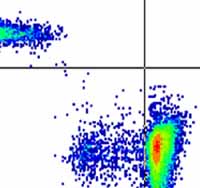Mar 29 2005
In a paper in this month's premier open-access medical journal PLoS Medicine, Mark Larche and colleagues from Imperial College London describe a subset of cells that might be able to suppress cells that cause cat allergy.
 Identifying the T cells that suppress proliferation to allergens after immunotherapy. (Photo: Mark Larche, et al.) Identifying the T cells that suppress proliferation to allergens after immunotherapy. (Photo: Mark Larche, et al.) |
Asthma and allergy have become more frequent in all industrialized countries during recent decades, and there is much debate about exposure to pets in early life and later development of asthma and allergy. Some studies have suggested that keeping pets actually protects against later allergy - i.e., that early exposure may somehow modify an individual's immune system to tolerate specific antigens. Various attempts to modify abnormal immune responses to specific allergens, such as those to cat dander, have been made. Investigators have previously treated patients with related molecules, either peptides derived from the allergen itself, or much smaller peptides produced synthetically. Although therapy with peptides seems to reduce allergic responses, the mechanism of the response to treatment has not been clear; in particular, it is not clear exactly which cells are involved in modifying the immune response.
Larche and colleagues investigated this pathway further by treating individuals who were allergic to cats with short synthetic peptides based on the major trigger for cat allergy and then measuring the clinical and immunological response to allergen. They found that treatment with the peptides led to the production of a population of T cells that suppressed the proliferation of allergen-reactive T cells in vitro.